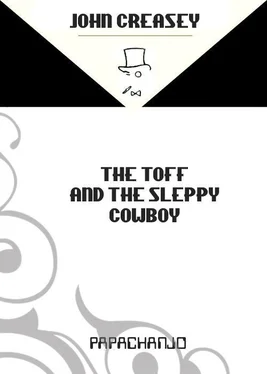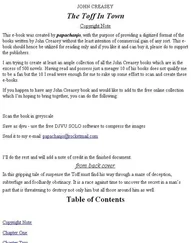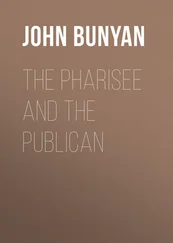John Creasey - The Toff and The Sleepy Cowboy
Здесь есть возможность читать онлайн «John Creasey - The Toff and The Sleepy Cowboy» весь текст электронной книги совершенно бесплатно (целиком полную версию без сокращений). В некоторых случаях можно слушать аудио, скачать через торрент в формате fb2 и присутствует краткое содержание. Жанр: Старинная литература, на русском языке. Описание произведения, (предисловие) а так же отзывы посетителей доступны на портале библиотеки ЛибКат.
- Название:The Toff and The Sleepy Cowboy
- Автор:
- Жанр:
- Год:неизвестен
- ISBN:нет данных
- Рейтинг книги:5 / 5. Голосов: 1
-
Избранное:Добавить в избранное
- Отзывы:
-
Ваша оценка:
- 100
- 1
- 2
- 3
- 4
- 5
The Toff and The Sleepy Cowboy: краткое содержание, описание и аннотация
Предлагаем к чтению аннотацию, описание, краткое содержание или предисловие (зависит от того, что написал сам автор книги «The Toff and The Sleepy Cowboy»). Если вы не нашли необходимую информацию о книге — напишите в комментариях, мы постараемся отыскать её.
The Toff and The Sleepy Cowboy — читать онлайн бесплатно полную книгу (весь текст) целиком
Ниже представлен текст книги, разбитый по страницам. Система сохранения места последней прочитанной страницы, позволяет с удобством читать онлайн бесплатно книгу «The Toff and The Sleepy Cowboy», без необходимости каждый раз заново искать на чём Вы остановились. Поставьте закладку, и сможете в любой момент перейти на страницу, на которой закончили чтение.
Интервал:
Закладка:
“I don’t mean the blonde,” he said. “I mean the automobile!”
“Oh, the Bristol.”
“Come again.”
“The Bristol. B-R-I—”
“I know how you spell the name of the maker,” interrupted Loman. “You don’t have a name for her?”
“No.”
“I thought all the British had a name for their auto-mobiles. Like Genevieve, or something.”
“Genevieve —” began Rollison, and then he laughed outright. “Did you see the film of the old crocks’ race?”
“I surely did, answered Loman. “It was a dandy. So you don’t have a name for this beauty?”
“I’m afraid not,” Rollison said.
Loman shrugged, and they turned into the door of the house where Rollison lived. The tall American had to duck to get beneath the lintel, and once inside, stood and gaped up the narrow well of the staircase and the narrow staircase itself, with its wrought iron balustrade and the purple carpet. He held on to the rail as he went up ahead of the Toff, paused at each half and each main landing to look down, reached the landing before the Toff’s and stood still.
“Why don’t you find a name for your car?”
Rollison said amiably: “If you really want me to, I’ll consider it.”
“Sure, I want you to. An automobile like that shouldn’t be anonymous. Mr. — Rolly. Will you tell me something?”
Rollison thought: He can’t put the subject off much longer, and said: “Yes.”
“What happened to your automobile?” asked Loman. “In what way do you mean?”
“The holes. The dents. The gashes. Boy, they certainly made that automobile of heavy grade steel, any ordinary auto would have been like a pepper pot. It didn’t happen long ago, the edges where big pieces of metal tore through the steel are bright as silver. No oxidisation. So — what happened to the Bristol, Mr. — Richard?”
Rollison started up the stairs, but suddenly Loman gripped his arm with powerful fingers, and unless he wanted a struggle, it would be folly to pull himself free.
He saw the front door of his flat open an inch and had no doubt that Jolly was behind it, listening: he would have wondered why they were taking so long getting upstairs.
“A youth on a motor-cycle threw a hand grenade, but missed the window,” Rollison said clearly. “It struck the ground and went off : the Bristol caught most of the splinters.”
The door opened wider, an indication of Jolly’s concern.
Thomas G. Loman’s mouth dropped open and he took his hand away.
“Today?” he asked.
“Today.”
“In England?”
“At London Airport,” Rollison asseverated.
Thomas G. Loman blinked, closed his mouth and gulped, then slowly shook his head and said in a hopeless-sounding voice: “England is a surprising country. It sure is.” He started up the stairs again, still shaking his head — until Jolly opened the door wider still, showing his concern.
They were at the top landing.
Loman looked at Jolly as if at an apparition: the black jacket, grey cravat, striped trousers and highly polished black shoes. The sparse grey hair, too, and lined face. The melancholy brown eyes were turned towards Rollison and not until he was satisfied that his employer was unhurt did he acknowledge Loman, inclining his head and saying:
“Good afternoon, sir.”
“Jolly,” Rollison said. “Mr. Loman will be staying with us for a few days. And meanwhile, if lunch hasn’t spoiled —” He paused hopefully.
“Will ten minutes be all right, sir?”
“Perfect,” said Rollison. “You look after things in the kitchen, I’ll take Mr. Loman to his room.”
Jolly went the back way; Rollison led Loman into the study-cum-living room and saw him rake the Trophy Wall with his gaze. They both paused for a few moments, not saying a word, before Rollison led the way by the other passage to the spare room. This was small, but had a large bed across which even a man of six feet six could sprawl. Rollison saw at a glance that Jolly had cleared away the usual vanities and accessories that delighted a woman and had put out a set of silver backed brushes and silver combs. Some leather containers were there for masculine needs, and Jolly had placed the day’s news-papers as well as the latest Time and Playboy on the bedside table.
Loman appeared to take all this in at a glance, then turned and looked down at Rollison from his great height and demanded in an unbelieving voice:
“Did you call him Jolly, Rolly ?”
He stood there determinedly bewildered. His mouth opened half an inch and the expression in his eyes reminded Rollison of Pamela Brown’s. There was some-thing so helpless-seeming about him that, whether it was deceptive or not, Rollison felt the kind of sympathy he would feel for a young calf which had strayed from its mother. The spontaneous chuckle which had overtaken him several times today bubbled up and over, but not until he had said:
“Yes. Yes and — it’s not supposed to be funny.” He gave a snort of laughter but won only bafflement from Tom Loman. “He — he has been with me since before I was your age,” he managed to say.
“You mean he’s a family retainer?”
“You could say that,” Rollison agreed.
“Family retainers and jet aircraft, airport bombings and a man who doesn’t turn a hair at any kind of danger. Are you sure this is England, Rolly? Not Alice-inWonderland or something out of Hogarth?”
“Not Alice nor the eighteenth century,” Rollison assured him. “The bathroom’s through that doorway. Can you be ready in five minutes?”
“Sure can,” Loman assured him. He studied Rollison deliberately then shot out his long arms and dropped his hands on Rollison’s shoulders with the now familiar powerful grip, and went on in a deeper voice: “And after we’ve eaten we just have to talk. And I mean talk.”
“We shall talk,” Rollison promised, faintly.
Five minutes later, Loman entered the big room by the rear passage, a little ahead of Rollison. He went straight to the fireplace, just then screened, and surveyed the Trophy Wall. In fact he did not move until Rollison appeared; even then, he only moved his eyes.
“Will you have a drink?” asked Rollison.
“I guess not,” answered Loman. “Mr. Rollison, am I correct in believing that collection is unique?”
“I think it probably is,” Rollison said.
“I’m darned sure it is,” said Loman, with a surge of vigour. “I read about that, somewhere. I don’t remember much about it but I remember reading about that wall.” He saw Jolly appear from the other direction, carrying a steaming dish, and was soon at the hotplate near the table, helping himself to stewed beef which had been cooked very slowly in a red wine and flavoured with delicate spices that gave it a rare aroma and delicious savour. He finished long before the Toff, who jumped up, took his plate, and said:
“Let me get you some more.”
Loman took a second helping, ate somewhat more slowly, and shook his head sorrowfully when offered a third. As Jolly was bringing in a crisp-looking open apple tart and some whipped cream, he said:
“Did you cook that, Mr. Jolly?”
“That was my pleasure, sir.”
“You want to know something?” Loman asked. “At any hotel or restaurant in Tucson, you could make a fortune.”
Jolly kept a wholly straight face.
“That is very gracious of you, sir, but I am very happy where I am.”
“In London?” asked Loman.
“Yes indeed, sir. Will you have —?”
“It’s always warm in Tucson.”
“I am sure it is a delightful place, sir, but when one is getting on in years one moves from the familiar only with great reluctance.”
Читать дальшеИнтервал:
Закладка:
Похожие книги на «The Toff and The Sleepy Cowboy»
Представляем Вашему вниманию похожие книги на «The Toff and The Sleepy Cowboy» списком для выбора. Мы отобрали схожую по названию и смыслу литературу в надежде предоставить читателям больше вариантов отыскать новые, интересные, ещё непрочитанные произведения.
Обсуждение, отзывы о книге «The Toff and The Sleepy Cowboy» и просто собственные мнения читателей. Оставьте ваши комментарии, напишите, что Вы думаете о произведении, его смысле или главных героях. Укажите что конкретно понравилось, а что нет, и почему Вы так считаете.












